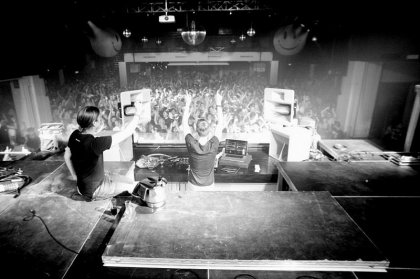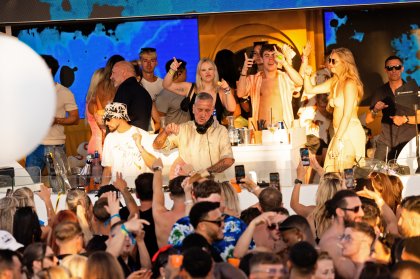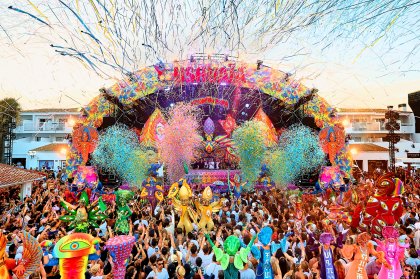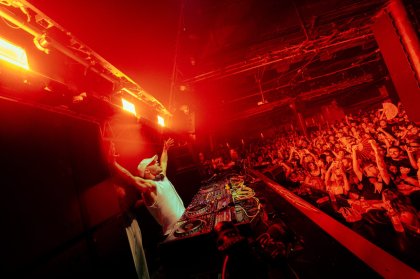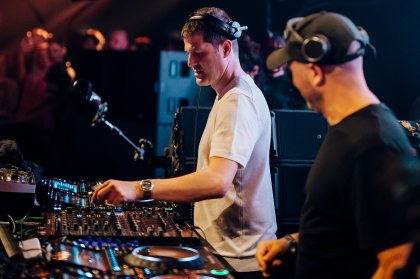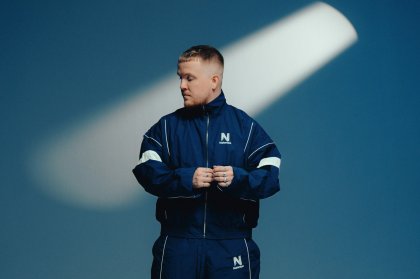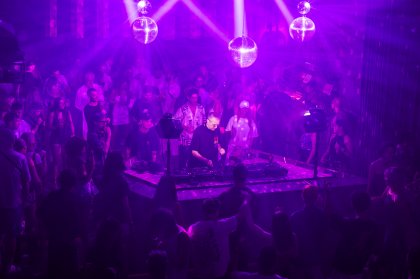Sebastian Devaud wants to be disconnected. He is not an existentialist; neither is he a loner but instead a man who values original inspiration. In today's environment of inescapable interconnectivity where people demand an ever more instantaneous experience, kick, or emotion the French export continues to fly the flag for the deep and the meaningful under his DJ pseudonym: Agoria.
Beginning his electronic journey in amongst a spread of illegal parties before rising to co-found the Lyon festival Nuit Sonores, Devaud is known for crafting a sleek techno sound resplendent with different influences, from the operatic to the secretly remarkable. Sharing brainwaves with motor city Detroit and its artistic exponents the Agoria aesthetic is both accessible and highly refined. His travelling audio-visual installation FORMS, an expansive video-mapped leviathan, toys with the level of sensory exchange expected from DJs in pursuit of a more immersive experience. After moving on from Nuit Sonores, his label InFiné, and France - with a relocation to Milano - he is able to view the industry and his work with refreshingly acute objectivity. Aside from his productions, Devaud now works on the creation of soundtracks and scores for French cinema whilst exploring off-kilter creation processes.
After releases on Ovum, Planet E and Bpitch Control his recent Scala EP on Innervisions has been adopted by the island as a soothing cut of anthemic euphoria. Ahead of a flight to Tel Aviv and his appearance at We Love's Closing Party this Sunday I caught Devaud for an espresso-fuelled conversation about scale, ego and the perils of not being tall.
You use a lot of strings and piano - classical instruments - in your tracks. Is striking the balance between these emotive elements and necessary dancefloor functionality something you find yourself meditating on?
"I am not an artist who thinks I shall use only this or that to achieve an outcome. I do not think about purpose. When I start to make a track I usually try to find a melody using the piano. Sometimes I try to find another sound, more synthetic, more electronic, to use in place of the keys. Then again, if it is good and I like it, why shouldn't I just keep the original form? With the strings it is the same. If I like the sound of these acoustic elements why should I try to find synthetic alternatives?"
"There is one thing you cannot control, and that is what you have in your blood. The first record I bought was Good Life - Inner City. My mother was an opera singer so throughout my childhood I was surrounded by either dance-orientated music or my mother practicing her parts; I am influenced by both worlds."
You work on soundtracks and film scores. Does this work influence your electronic productions? Feed in to your use of scale and space?
"Sometimes I make something really epic and don't release it because I think "this is too much." The soundtracks do influence me. When I make a piece for a movie, it either works for it or it does not. If it doesn't, but I like it, it can give me elements for a new track. The strings on Scala came from an old work, but the track as it is now is actually for my wife. She is really funny and always bright - the melody reminds me of her."
"You must have your head in the clouds but your feet on the ground"
You mentioned beginning your production process with a piano line, did you receive any classic training or teaching?
"I did for one year as a child but I stopped because I was really lazy. To be honest I am so bad, really bad. A studio allows you to play something really badly and you can just adjust it. Now I have friends who are virtuosos of piano, they are genius, and so now I have worked with them I do not want to try. Let us use everyone for what they do best."
"I often make music when I'm down and feel melancholic or when I'm really, really happy. Music made in between these emotions often sounds monotone to me."
Is the content of your tracks then, a snapshot of your state of mind at the time?
"I think the majority of inspiration comes from everyday life. When you are at emotional extremes it gives you natural food for making music - more so than from a constant routine, or a normal day. Every change, even little things, have a big impact. Recently I moved to Milano and after spending all my life in Lyon and France it was a big step. A new city, new environment, new studio and meetings: it has been a good food."
You have founded and nurtured various high profile projects such as the Nuit Sonores festival and the label InFiné. Is focusing on your own personal development now your full time project?
"I never really think in terms of a 'career'. I have always done whatever I feel in the moment and maybe it has resulted in a longer more complex journey. The most difficult thing is finding time for me. Time runs very fast when you are touring and have a family. Some artists just stop writing but I cannot do that. I need to do my own thing and create an environment where I do not have to deal with bookers, agents, press people - after dealing with 500 emails you are not motivated to work in the studio."
"I began to associate with Brigitte Maccioni who is famous in France for being the director of UJC - the French film company - we are working very closely to make me disconnected from the real world."
It is interesting that inspiration comes from outside of the industry yet is fed back into it. To find that inspiration you need the disconnect.
"It is really difficult. When you release your first album or records you have people sending you nice emails, nice information, requesting things - it can become like a drug. Everyday you check your computer and you are waiting for the good news, the propositions. You spend all day being connected in this one way but step-by-step your music can become more rare - which although that is a good thing today - I feel it is dangerous."
I suppose because it is about the music, but not the music itself, the excitement is still there - you don't realise.
"The most important thing for an artist is to be disconnected in all ways: from day-to-day life, from emails, from everything. Today it is so easy to be influenced. You must have your head in the clouds but your feet on the ground, so you have to be really tall, and I am really little - this is the problem."
Your audio-visual installation, FORMS matches video mapping and interactive live visuals to your music. Obviously along with your work on film scores this A/V marriage is something that has interested you for a long time.
"There are two reasons [why I started the project]. In the beginning the concept was done for the French scene - I wanted to play in more indie festivals as we have so many festivals but few clubs. I really wanted to play in front of really large crowds - 20,000 people - without playing cheesy music. In a normal circumstance, if I played a one or two hour classic techno set like I would in Berghain or Panorama it would be very difficult to keep the attention of 20,000 people who don't know the music. So how could I do this? With FORMS, if people are not really 'thinking' about what they are listening to but are just enjoying without trying to analyse then for sure they will get the groove and become new fans of electronic music in France."
"The second is that this period is really interesting artistically. We can work with so many different forms of media: video, architecture, cinematography, dancers. Combining all these gives us the ability to present a kind of art that is completely new. In the last decade it was about mixing different kinds of music in this decade it is different kinds of art."
"I am currently working with a French film director named Jan Kounen. He is writing the synopsis and I am writing the music at the same time. I create the music and he is influenced by it to create the story, which then changes my music. This is all before shooting the movie."
The visuals, are they controlled by a separate engineer or via a kind of MIDI control?
"It is all improvised live by a visual team. When we do a tour or many gigs in a short space of time it is easy because they know the build of the set and I make them listen to the tracks so they can prepare accordingly. We started the project a year and a half ago and so the music has totally changed, only two or three tracks still remain and that is only because they are connected with specific visual pieces."
"Even if the track listing is similar it remains totally improvised, it must be otherwise you lose the groove, the emotion. In a club you play your first track and have no idea where you shall end up but with FORMS I know exactly where I go. Sometimes I look to the image to see if it is good, if the momentum is right for a switch - there is a real exchange."
Club DJs who consider the visual element are rare. Why do you think this is? Visuals emphasize the music do they not?
"Yes and no. Sometimes it is better to close your eyes and just listen to the music. Music, and being in a club is a good way to escape something, reality and not think about anything. Images catch the attention in a different way but the image can pollute the music if it is not well connected. For clubs, it is all about the lights - and nobody speaks about the lights. To be in the dark or not be in the dark."
"There was a night I played in Trouw in Amsterdam. The concept was that you play all night long - maybe 7 hours - in the pitch black. I played 6 and a half hours with no ligtht at all, absolutely none. The CDJ LEDs were hidden with stickers and black curtains covered the bar. You couldn't see 2cm in front of you. In the dark you don't listen to music in the same way, you are really deeper in it. Near the end I said now I will put one or two tracks and for the climax of these tracks lets put a real flash of light, a big white thing. When it appeared after 5 or 6 hours of the darkness - I will remember this moment for the rest of my life. I saw the faces of the people and they were in another world and then - it was beautiful, truly fantastic."
"Today it is much more important to have a video of you with your arms in the air and 10,000 people with their arms in the air. The evil of social networking. For me it is as important to make something deeper, really intense rather than smash in a snare and a roll drum every two minutes. Today people judge so fast, if they hear you play once they think that you will always play that way. A good DJ is very versatile, it is why I still love to DJ. One person will see me and say he played very hard the other, very deep, and if these two people meet they think 'was it the same guy?' - I like that."
You have just released your Scala EP on Innervisions. Do you have any current or future projects you'd like to share?
"I have two remixes on the way. One is a remix for Art Department on their No.19 Music of the Martina Topley-Bird cover of The XX's Crystalised. The other is a remix of a French band named GRIEFJOY, but myself and Everydayz - a hip-hop artist - as Sunlune."
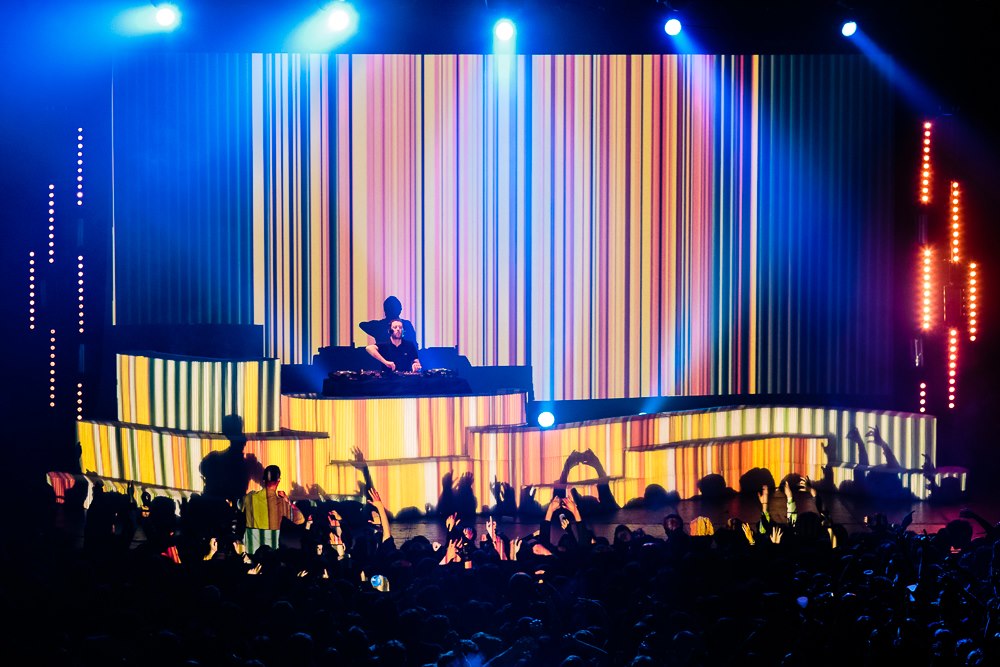
Agoria will play We Love's Closing Party this Sunday 29th September.
